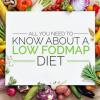CYBERMED LIFE - ORGANIC & NATURAL LIVING
CYBERMED LIFE - ORGANIC & NATURAL LIVING
 What is a low FODMAP diet?
What is a low FODMAP diet?
A low FODMAP diet cuts out many common products that contain certain foods. The principle behind the diet is to give the gut a chance to heal, especially if you have GI problems like IBS. People with GI disorders may use this diet as part of their treatment.
This diet may be difficult to follow, and it is advisable to contact your health care professional or a dietician to make sure that you are on the right track and getting enough dietary nutrients that you can consume.
FODMAPs are short chain carbohydrates and sugar alcohols that are poorly digested by the body. They ferment in the large intestine (bowel) during digestion, drawing in water and producing carbon dioxide, hydrogen, and methane gas that causes the intestine to expand. This causes GI symptoms such as bloating and pain that are common in disorders like IBS.
FODMAPs are in some foods naturally or as additives. They include fructose (in fruits and vegetables), fructans (like fructose, found in some vegetables and grains), lactose (dairy), galactans, (legumes), and polyols (artificial sweeteners).
These foods are not necessarily unhealthy products. Some of them contain fructans, inulin, and galactooligosaccharides (GOS), which are healthy prebiotics that help stimulate the growth of beneficial gut bacteria. Many of them are otherwise good for you, but in certain people, eating or drinking them causes gastrointestinal symptoms.